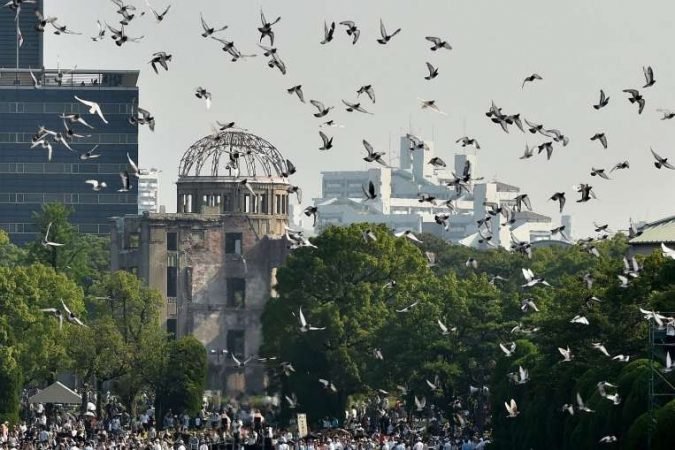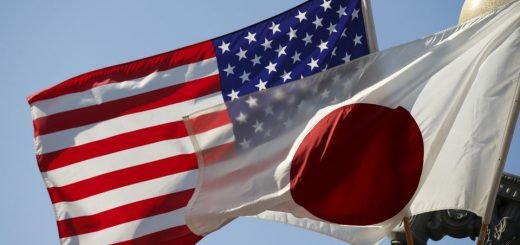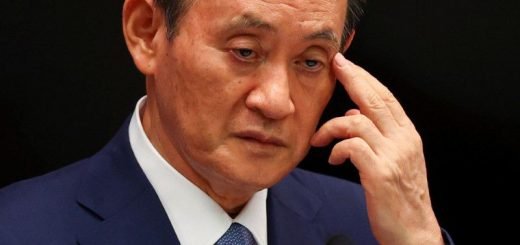Vulnerable Japan Remembers a Bitter Defeat

This week marks the 75th anniversary of the end of World War II. Victorious countries proudly remember the heroism and sacrifice of their soldiers. But in Japan, where the war brought devastation to Hiroshima and Nagasaki, there is always great sadness.
There is also an intense debate in Japan about how it should defend itself and to what extent it can rely on its ally the United States for protection.

The BBC’s Bill Whiteford has been discussing Japan’s situation with the Editor of Asian Affairs, Duncan Bartlett.
Bill Whiteford: Let’s think about how far Japan has come in the past 75 years. After the Second World War, it was a devastated country and under the heel of America. Is that still the situation?
Duncan Bartlett: Well, it’s very much a key policy of Japan to be an ally of the United States and America’s best friend in Asia. That policy was decided in 1960 by Nobusuke Kishi, the grandfather of the current prime minister Shinzo Abe. Japan is also seeking to maintain a very good relationship with the United Kingdom. Recently, the Japanese Foreign Minister Toshimitsu Motegi held a series of meetings with the British Foreign Secretary, Dominic Raab. They talked about trade between the UK and Japan and they also talked about the importance of being on the same page as the Americans in terms of security and defence. Mr Raab told Mr Motegai that the UK is committed to “a free and open Indo-Pacific.”
And so as we remember the anniversary of the bombings of Hiroshima and Nagasaki, I think we should consider the debate about nuclear weapons. Japan is protected by something like 50,000 American soldiers who remain in 23 bases across the country. The US military force is also supported by America’s fearsome nuclear capacity, which Japan depends on as a deterrent.
Bill Whiteford: Yes, that’s interesting, even though Japan has this very pacifist outlook when it comes to defence. The big player in the region now is China and they have made efforts to court Japan in their favour, somewhat unsuccessfully. But China and Japan have a troubled history, don’t they?
Duncan Bartlett: Yes, it is a tense relationship. The territorial waters between Japan and China are constantly in dispute. Just last week, Chinese boats were challenging the Japanese in the Senkaku islands. As China becomes very much more assertive, a new generation of Chinese weapons could wipe out Japan’s defences very quickly.
There is also a threat from North Korea. Since the spring of 2019, the North Koreans have carried out 33 missile tests and they have used their official propaganda to warn that they are about to show a new type of weapon. So it’s not surprising that Japan feels quite vulnerable and for that reason, it’s keen to stay friends with its powerful ally, the United States, even though that’s a difficult relationship under Mr Trump, who has said that Japan needs to pay more money for keeping all those US soldiers and military bases there.

Bill Whiteford: Is it possible to see a scenario in which China becomes even more belligerent towards Japan? Would China pick a fight and where would the flashpoints be?
Duncan Bartlett: The relationship between China and Japan is in a state of flux but what we’ve seen across the world in the past 18 months or so is a lot of frustration and anger directed at China, as a result of COVID, the treatment of the Uighurs in Xinjiang and the situation in Hong Kong.
Globally, there’s a lot more scepticism about China and the Americans are talking about decoupling. The US is putting pressure on the United Kingdom to do less business with China, or at least approach China in a different way.
In parallel to that, the British relationship with Japan has become closer. Japan is hoping to sign a free trade deal with the UK soon. That would be the largest deal yet for the British government, as it prepares for the end of the EU transition period. The UK’s international trade secretary, Liz Truss, has said it’s absolutely critical to Britain. So, Japan is benefiting from scepticism towards China, because it offers more business opportunities to the Japanese.
Bill Whiteford: But Japan has problems economically – at least a decade of stagflation – and an ageing population. Is its economy in a position to grow?
Duncan Bartlett: It is a cause of sadness for the people of Japan that after tremendous growth in the 1960s, seventies and eighties, something went wrong. Many books have been written about the cause of its economic problems but it is clear that the economy of Japan has not been growing. In fact, it’s been in and out of recession and now Japan is facing two enormous blows. One is the COVID-19 crisis, which is affecting the global economy, including all Japan’s export destinations. Secondly is the great shadow now hanging over the Olympic Games. The event was due to take place in July this year. Officially it’s been postponed, but I’ve been talking to newspaper editors in Tokyo, and they say it’s very unlikely to go ahead in the summer of 2021.
Bill Whiteford: And let’s just finish by looking back to where we started, which was these horrible bombings in Hiroshima and Nagasaki. To what extent now will this 75th anniversary draw a line under them for the Japanese people, or will they always be a formative experience when it comes to modern Japan?
Duncan Bartlett: Well, the bombings of Hiroshima and Nagasaki are entwined with the Japanese constitution, which prevents it from ever raising an army. So Japan is only able to have a self-defence policy. Now this current prime minister Shinzo Abe has discussed quite openly his ambition to change the constitution, in order to allow Japan to have something like a more regular army. But public opinion in Japan is not ready for that change. I’m sure that’s because many people remember the awful events of August 1945, and they don’t want to do anything which could set Japan back on the path towards militarism.
This conversation was originally broadcast by the BBC on Good Morning Scotland: The Weekend Edition. The producer was Jamie McDonald.


















